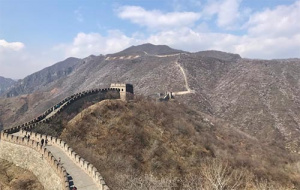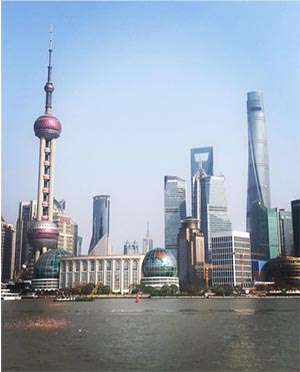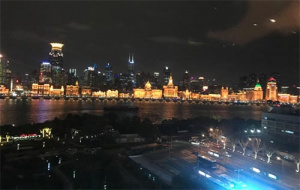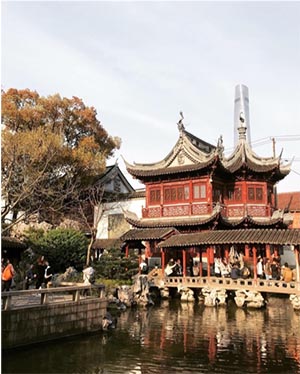China travel diary
 David and Lois Sykes Scholarship to China Travel Report – Emilie McDonnell (DPhil, Law)
David and Lois Sykes Scholarship to China Travel Report – Emilie McDonnell (DPhil, Law)
18-30 March, 2019
Trip Overview
Between 18 and 30 March 2019, I travelled to China on the Rhodes Scholars China Trip, which is a two-week programme that brings a group of Rhodes Scholars studying a Master’s or DPhil at the University of Oxford to both Shanghai and Beijing. I travelled with 10 other Rhodes Scholars from a range of constituencies and backgrounds and 5 Chinese Rhodes Scholars who organised the trip.
This theme of this year’s trip was International involvement and Technology, which we explored through a series of events and discussions over our two weeks in China. The aim of the trip was to bring a diverse and representative group of scholars from various constituencies and academic backgrounds onto the programme. The programme sought to provide myself and other participants with a better understanding of the issues facing contemporary China, by exposing us to an array of perspectives, people, and locations. It is also used as a way to promote the Rhodes Scholarship and the University of Oxford to Chinese students. In addition, the organisers hope that we will develop ties with the students we meet in China.
Our itinerary included 6 days of compulsory events. I visited China’s top universities, firms, businesses, civil organisations, think-tanks and met with academics and experts to obtain in-depth learning about China. I also visited high-tech companies and NGOs, discussed innovation and social responsibility with senior entrepreneurs and scholars, and met and exchanged ideas with Chinese university students. These events allowed me to meet an array of people from different backgrounds and with different perspectives and opinions of China, Chinese life and issues. I met businesspersons, judges, students, teachers and young people, discussed legal, human rights and refugee issues with a number of lawyers working in these fields and students passionate about similar issues. I also had the opportunity to present on refugee and migration law. We canvassed issues from the Chinese government and politics to renewable energy and human rights to capitalism and work ethic to the use and growth of technology in China.
 Engaging in such thoughtful discussions with such a variety of people and sectors really allowed me to expand my understanding of China, question my own thinking and way of doing things, as well as make me consider issues that I had not thought about before or in depth, in a new region and context, from how a country can navigate such a huge population, the value of money, community values and more.
Engaging in such thoughtful discussions with such a variety of people and sectors really allowed me to expand my understanding of China, question my own thinking and way of doing things, as well as make me consider issues that I had not thought about before or in depth, in a new region and context, from how a country can navigate such a huge population, the value of money, community values and more.
We were immersed in Chinese university life, staying at the dorms in ShanghaiTech University while in Shanghai and at Tsinghua University while in Beijing. I also got to explore China’s culture, history and food first-hand which was something I had wanted to do for a long time. I visited and hiked up to the Great Wall, explored the Forbidden City, wandered Old Shanghai, experienced the magic and atmosphere of the hutongs in Beijing, visited art galleries, as well as spent perhaps too long indulging in food at restaurants, street stalls and business meetings. It was incredible to be able to experience these sights, food and culture with my Oxford peers from China who accompanied us; hear their stories, knowledge and for such places and experiences.
I learned so much about China, including its unprecedented growth and development, the political climate, future challenges and goals, its role in the world, and the community-focused culture. The trip showed me many different sides of China and I feel I have only just scratched the surface of this complex, vibrant and interesting country. I hope one day in the future I will have the chance to return to China and experience many more aspects and areas.
 Why China?
Why China?
I wanted to travel to China for both personal and academic/career-related pursuits. From a personal perspective, it would be my first time in China. I have always desired to learn much more about a country that is of great significance to my home country Australia. I knew the two were key trade partners and that many people move between the two countries for work, travel and to live, and that the rise of China is very important to Australia’s geopolitical and economic interests. However, my knowledge of China, Chinese society and the culture was very limited and something I had never explored in depth other than sporadic times at school and when following the news. I travelled to China to deepen my understanding of Chinese politics, history and government. I was certainly not disappointed.
Visiting and understanding China was also important for my career and my academic pursuits. I aspire to be a human rights and refugee lawyer working with an international organisation or the Australian government. Having an in-depth understanding of a major global player such as China is pertinent. In 2017, the Chief of the UN Refugee Agency highlighted the key role that China can play in solving refugee crises, through the investment of resources and development projects. I was intrigued by this and I really wanted the chance to explore these issues and the broader topic of refugee responsibility sharing in the region. Further, I have heard a lot about China’s human rights record, the oppression of minorities, such as the Tibetans, and the Great Chinese Firewall; the largest system of censorship in the world. It was important for me to consider how people in China and the region were considering and thinking about such issues.
 I was also intrigued by the theme of the Rhodes Trip of International Involvement and Technology. I am not in the technology field at all, but nonetheless, I have a strong interest in how countries and the private and public sectors engage internationally and the power of technology to solve social issues. I was interested in learning about international involvement and technology in the Chinese context, notably the rise of China and the profound role technology has played for its development, and how lessons learned could potentially be brought into the refugee and development fields.
I was also intrigued by the theme of the Rhodes Trip of International Involvement and Technology. I am not in the technology field at all, but nonetheless, I have a strong interest in how countries and the private and public sectors engage internationally and the power of technology to solve social issues. I was interested in learning about international involvement and technology in the Chinese context, notably the rise of China and the profound role technology has played for its development, and how lessons learned could potentially be brought into the refugee and development fields.
Tips for Future Travellers
Visas: Before leaving you will most likely need to obtain a visa from the embassy in London. This is a relatively straight forward process but make sure you have all the required documentation with you as well as ensuring sure you fill the online form correctly to match the type of trip you are doing e.g. for tourism, study, cultural exchange. Also, be prepared to wait in line for a long time for your appointment when at the embassy.
Travel Insurance: Always have travel insurance organised beforehand as you never know what will happen when abroad!
Sim Card: I would buy a sim card on arrival. You will need your passport to do this. You can get them at the airport (which is the simplest but more expensive) or from a store in the city. It is very useful for translating things, using google maps and making any emergency calls – China is a huge place and in some places people do not speak English, so not being able to get in contact with other travellers etc is difficult.
Money: Some international cards do not work in China and generally having cash is much easier, especially in small shops and cafes, so I would exchange some money beforehand or take money out at the airport. Any large sums of cash can be left in your hotel room, rather than carried around when touring.
Food: Vegetarian food was hard to come by in certain places, so it is good to ask people for recommendations and have google translate ready!
Transport: I would recommend buying a transportation card for your area; it can be used for all public transportation including cabs. China is a huge place, so it isn’t possible to walk everywhere. They can be bought from a Transportation Card Service Center or the Customer Service Center of all subway stations.
Find out more about the range of travel grants and scholarships available to assist Univ students on our Travel Grants page or read further travel reports.
Published: 17 December 2019
Explore Univ on social media
